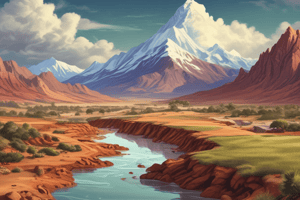Podcast
Questions and Answers
Earth Science is a branch of study within the field of social sciences.
Earth Science is a branch of study within the field of social sciences.
False (B)
Oceanography studies weather patterns and atmospheric conditions.
Oceanography studies weather patterns and atmospheric conditions.
False (B)
Hydrology is concerned with the study of ice-covered regions and glaciers.
Hydrology is concerned with the study of ice-covered regions and glaciers.
False (B)
Plate tectonics theory explains why continents move around on Earth's crust.
Plate tectonics theory explains why continents move around on Earth's crust.
Earth Science involves the study of ancient rocks and fossils but not living organisms.
Earth Science involves the study of ancient rocks and fossils but not living organisms.
Meteorology focuses on the study of water systems in lakes, rivers, and wetlands.
Meteorology focuses on the study of water systems in lakes, rivers, and wetlands.
Earth Science only involves physics and chemistry, excluding biology and engineering.
Earth Science only involves physics and chemistry, excluding biology and engineering.
Glaciology is a specialized field within Earth Science dealing with ice-covered regions and glaciers.
Glaciology is a specialized field within Earth Science dealing with ice-covered regions and glaciers.
The interaction between living organisms and their environment is not a part of Earth Science.
The interaction between living organisms and their environment is not a part of Earth Science.
Some aspects of Earth Science are related to human welfare while others focus on far older events like ancient rocks.
Some aspects of Earth Science are related to human welfare while others focus on far older events like ancient rocks.
Study Notes
Earth Science is a branch of study within the field of natural sciences that deals with the origin and development, structure and properties of the land surface, oceans, atmosphere, and their various phenomena such as earthquakes, volcanoes etc. It involves studying the physical features of the planet, its geological history, the interaction between living organisms and their environment, and also includes understanding how people have modified the landscape over time through agriculture, infrastructure, mining, and so forth. Some aspects of Earth Science pertain more directly to human welfare while others deal mainly with far older events in the past like ancient rocks, fossils, and other historical evidence found in the ground.
Some areas covered by Earth Sciences involve oceanography - which studies waves, currents, tides; meteorology - focusing on weather patterns, atmospheric conditions; glaciology - dealing with ice-covered regions and glaciers; hydrology - concerned with water systems in lakes, streams, rivers, wetlands, floodplains - and many more specialized fields related to the study of our home world. These diverse aspects within Earth Science make it one of the most interdisciplinary branches of natural sciences, involving physics, chemistry, biology, math, engineering, and social sciences among others. One notable achievement is the discovery of plate tectonics theory which explains why continents move around on the Earth's crust in ways we can observe today. Other significant developments in this field range from seismographs to satellites observing global climate change effects.
Moreover, Earth Science encompasses the practical applications of its knowledge too. For instance, how we build bridges using what's learned about soil mechanics or predict future droughts based upon climatic data collected decades ago. In summary, Earth Science covers everything from the very beginning to the present day and into possible futures, thus making it a critical area of scientific exploration essential for understanding our own place on Planet Earth.
Studying That Suits You
Use AI to generate personalized quizzes and flashcards to suit your learning preferences.
Description
This quiz delves into the various aspects of Earth Science, covering topics such as oceanography, meteorology, glaciology, hydrology, and more. It explores the interdisciplinary nature of Earth Science and its practical applications in understanding the planet's past, present, and future.




